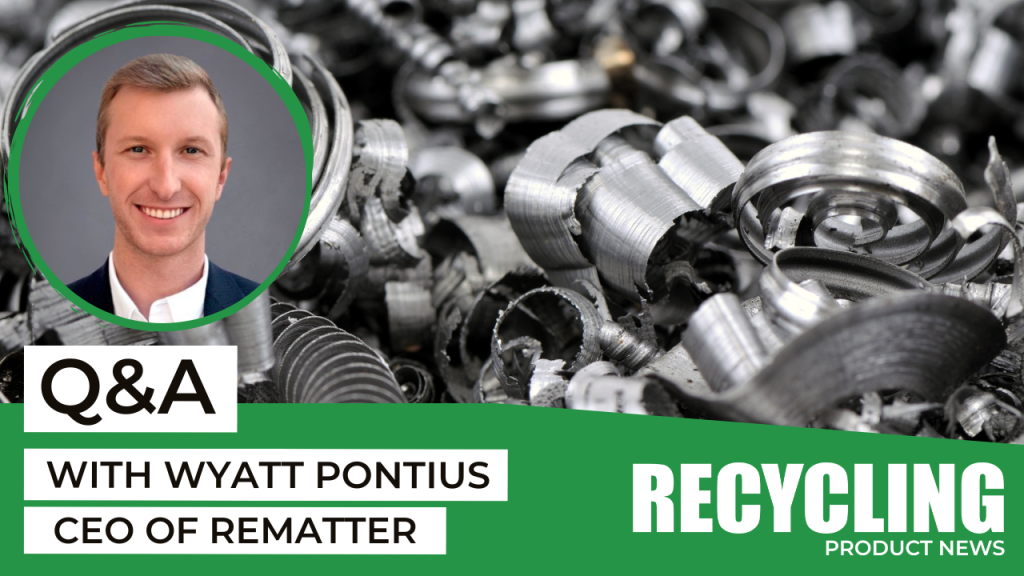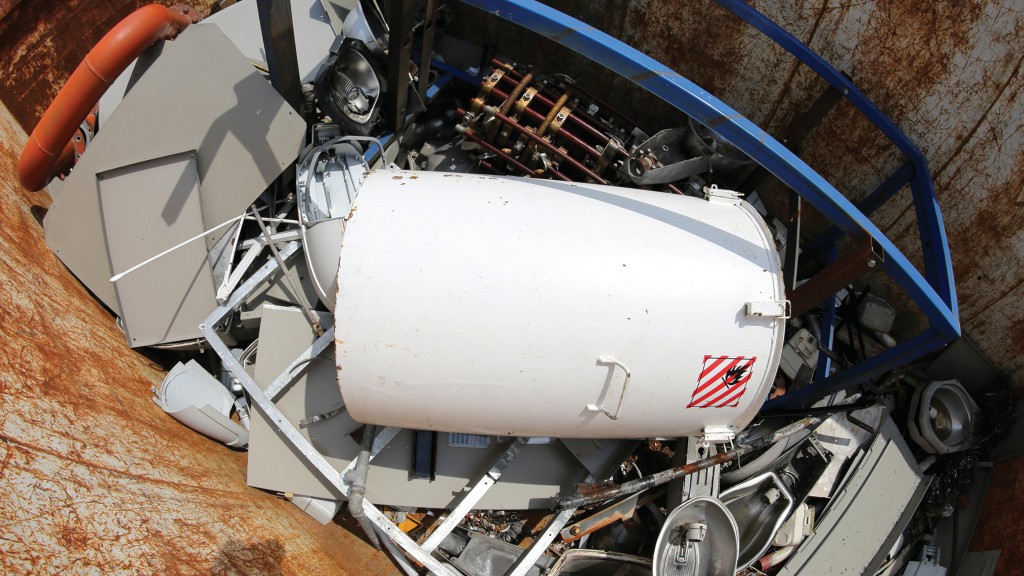Q&A: Wyatt Pontius on data-driven decision making, industry challenges & AI’s role in scrapyard software

As the metal recycling sector grapples with changing waste streams and an overall push for greater efficiency and sustainability, innovative software solutions play a pivotal role in addressing these challenges. Metal recycling software systems enhance efficiency in grading, pricing, inventory management, and other operational aspects that increase profitability while providing recyclers with the analytics and insights needed to make data-driven decisions and thrive in a rapidly evolving landscape.
I caught up with Wyatt Pontius, CEO of ReMatter, to discuss the critical role of software solutions in addressing challenges faced by recyclers, as well as the importance of ongoing collaboration between technology providers and recycling companies to ensure that advancements in software – particularly in areas like artificial intelligence – are tailored to meet the specific needs of the industry.
Slone Fox: In your experience, what are the most challenging obstacles that recyclers face today? How can software such as ReMatter help them overcome these hurdles?
Wyatt Pontius: Ultimately, the recycling business comes down to driving volume and profitability. Particularly in the current macroeconomic environment, it's more important than ever that recyclers have clear visibility into all aspects of their business to ensure they have sufficient volume to fulfill contracts, are purchasing material at prices that will enable them to operate at a profit, and are staying on top of their cash positions. With the right tools in place, operators can utilize this information across the various parts of their business to make their operations as efficient as possible, something which is particularly important at a time when hiring and retaining talent at a reasonable cost can be a challenge.
ReMatter not only provides operators with the tools to do their work more efficiently – allowing yards to do more with fewer people – but also provides decision makers with the data they need to be as effective as possible: traders with the information they need to maximize volumes and margins, shredder operators with the information they need to ensure they're running at maximum capacity, and controllers with the information they need to better manage AR/AP and inflows/outflows of cash, etc. Everything comes together in one place so you have complete visibility and control.
Many companies in the industry are embracing technology as another tool in their toolbox to maximize their business's profitability. It is key that there is ongoing active collaboration between technology providers and recycling companies. Stagnant technology can stagnate business progress, so continuous improvement from technology companies is critical to not hold the industry back.
SF: What potential disruptive innovations do you anticipate for the recycling industry, and how is ReMatter positioned to embrace these changes?
WP: There are multiple dimensions of technological development that are going to affect the recycling industry. Two that we're keeping a close eye on are digital technology and how new technologies will impact the material streams in the recycling industry.
Within the digital realm, the two biggest trends that will impact the recycling industry are the continued development and modernization of modern, cloud-based software systems that can help recycling companies optimize their operations, and the emergence of artificial intelligence (AI) tools that can complement these software systems. In a high-velocity environment like a scrapyard, having software that is accessible from any device and super simple to use is critical to keep things moving while maintaining accurate data. While AI often overpromises, industry-specific AI applications like computer vision to assist with material identification or LLM-driven reporting – when developed by experts – have the potential to help transform workflows as well. We focus on bringing in top talent who stay at the forefront of technology and are also speaking with recyclers to ensure we can bring about these innovations in a way that is not just hype, but genuinely helpful.
The other dimension is within new technologies, such as EV batteries and rare earth magnets, that will add new material streams to the recycling industry. We are constantly speaking with recyclers who are developing new processes to handle these material streams or are looking for solutions to the challenges they pose to existing processes. Building on top of ReMatter allows them to be agile, efficient, and successful in their approach to growth as the recycling landscape continues to evolve.
SF: Artificial intelligence has been a big topic recently. What role does AI play in scrapyard software, and what benefits and/or challenges does it present from your perspective?
WP: While AI has many use cases, there is also a lot of hype around AI in areas where it may not necessarily add much value. We believe that industry-focused software tools are best positioned to add value through AI innovation because at this stage in the technological development of AI, it's still best when used for specific tasks. Industry-specific data also provides the best training ground for the neural networks that power AI.
When thinking about how AI may impact a scrapyard, it's important to keep in mind the fundamental goals of the business and how technology can help achieve those goals. Ensuring material is accurately graded and priced, giving traders accurate inventory information and pricing insights, helping dispatchers make the most of the available drivers and vehicles, speeding up purchasing at the scale, and giving business recommendations are all practical areas where AI has the potential to make recyclers more effective. Computer vision, large language models, voice-to-text, autonomous agents, and more flavours of AI can make all of these things a reality.
The important thing to remember is that AI is not perfect and that while it may be easy to produce AI tools that appear interesting, they may not actually stand up to the test, especially in a fast-paced operational environment like a scrapyard. It's important to ask questions and ensure that the people pushing these tools are experts and can explain the value they can add to a business.
SF: How does software such as ReMatter enable yards to make data-driven decisions that positively impact their operations?
WP: The decisions that have the ability to affect the bottom line are those that help increase volume and increase margins, either through greater revenue or lower costs. As a result, the types of data that are the most useful and impactful for ReMatter users are those which help them be more effective buying material (insights on past transactions with particular suppliers, price trends per material), more effective selling material (insights on past transactions with particular customers, real-time inventory data), more effective transporting material (freight costs, driver/fleet efficiency metrics), and more effective managing inventory (acquisition costs, processing costs, inventory breakdowns by group and grade). While some data tends to be the most impactful universally, certain recyclers will have more benefit from filtering and slicing data in a way that is specific to their business. It's our philosophy that collaborating with recyclers and providing flexibility in the analytics they prioritize the most is the key to generating the most value for recycling operations.
SF: Looking ahead, what upcoming developments or trends in the industry are you most excited about?
WP: Across the board, we're seeing more and more industries push toward lower emissions, which ultimately should benefit the recycling industry. The most visible that we're interested in tracking is the move toward electric vehicles. As an example, Redwood Materials recently announced that they were expanding their supply agreement with Toyota for battery production.
On the other side of the equation, with end-of-life batteries, recyclers will have an opportunity to choose how they want to handle these materials. Batteries pose both process and safety challenges for recyclers, and we're seeing the industry begin to consider approaches from aggregating and shipping to processing in different ways on their own. Across the board, cataloging the different types of batteries, how they can be made safe for storage and/or processing, and what the expected recovery would be is really important.
The other area that we're closely monitoring - though not necessarily excited about - is the macroeconomic situation with interest rates and the corresponding impact on things like inflation, employment, commodities pricing, and overall economic activity. There's been a lot of cheap money in the past few years that led to things like acquisitions and continued investment, but also led to outsized inflation. Changes in monetary policy impact recyclers directly. Because we view ourselves not just as technology providers but true partners to our customers, we're staying on top of these trends and their impacts closely to understand the ways that we can help our customers and the industry.



